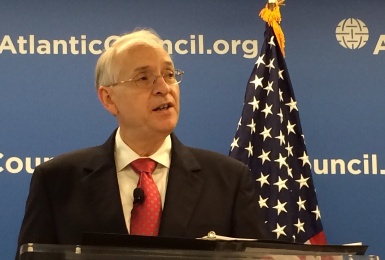US loosens sanctions on personal communication items to Sudan
February 17, 2015 (WASHINGTON) – The United States Department of Treasury’s Office of Foreign Assets Control (OFAC) announced on Tuesday that is amending Sudan’s sanctions regime to allow exports of personal communications hardware and software including smart phones and laptops.

“These changes are consistent with our commitment to promote freedom of expression through access to communications tools,” Booth told reporters.
“These changes also support our aim to help Sudanese citizens integrate in the global digital community” he added.
He noted this week’s decision of Sudanese authorities to seize 14 newspapers saying that this is a prime example of the need to enable people to have access to communication tools.
OFAC said in its press release that the easing of sanctions is consistent with the US government’s “commitment to the advancement of the free flow of information and to facilitate communications by the Sudanese people, including during a national dialogue”.
This month, the Sudanese presidential assistant Ibrahim Ghandour concluded a rare visit to Washington where he held talks with senior officials at the White House and State Department.
The Sudanese foreign minister Ali Karti also visited Washington separately this month to participate in the National Prayer Breakfast together with US president Barack Obama and international dignitaries.
It was also reported today that the U.S. Deputy Assistant Secretary in the Bureau of Democracy, Human Rights and Labour Steven Feldstein will visit Sudan next week.
Sudan is on the US list of countries supporting terrorism since 1993 and also subjected to economic sanctions since 1997.
Washington acknowledges Sudan’s cooperation in the fight against terrorism, but attached new conditions to normalizing ties related to the end of the conflicts in Darfur, Blue Nile and South Kordofan.
Sudanese officials however, insist that issues of bilateral relations should be discussed without interfering in Sudan internal affairs.
The lifting of US digital technology sanctions on personal communication items has been a focus of a campaign launched last year by Sudanese civil society groups named “The Sudanese initiative to lift US sanctions on Sudan”.
According to a report that appeared on Indexcensorship.org, an international organisation that promotes and defends the right to freedom of expression, the campaign argued that these sanctions negatively impact Sudanese citizens’ access to information communication technologies (ICT) in a number of sectors, including educational institutions, pro-democracy civil society and humanitarian efforts that utilize geographic information system (GIS) technology.
Mohamed Hashim Kambal, the campaign’s coordinator was quoted as saying that “Through talking to Sudanese citizens belonging to a wide variety of sectors it is clear that US sanctions not only hampers access to independent information but also access to knowledge and to aspects of the internet related to crowd sourcing and crisis mapping”.
“We want to be clear that this is not an appeal to lift all sanctions from the Sudanese regime that continues to commit human rights atrocities. This is an appeal to empower Sudanese citizens through improved access to ICTs so that they can be more proactive on issues linked to democratic transformation, humanitarian assistance and technology education — an appeal to make the sanctions smarter,” Kambal added.
The Indexcensorship.org report noted that users inside the country cannot purchase original software online and that they along with universities, rely heavily on pirated software that cannot be updated online automatically and is often ridden with malware.
Sudanese pro-democracy NGO’s are unable to directly crowdfund from Sudanese Diaspora directly, the report noted because of US sanctions that don’t permit the transfer of funds to or from Sudan.
SPLM-N URGES PRESSURES
The SPLM-N secretary-general Yasir Aman expressed hope that Feldstein’s visit to Sudan will help to focus on the “gross human rights violations” committed by the Sudanese government.
“The Sudanese people will expect the engagement between the Sudan government and the U.S. to improve the human rights situation and to restrain the Sudan government from continuing its ugly practices,” Arman said.
In a statement he released in English, he pointed to the denial of humanitarian access to civilians in the rebel areas in South Kordofan and Blue Nile states and Darfur region, the bombing of medical dispensaries, hospitals schools and water points.
He also mentioned the imprisonment of opposition leader and rights activists and the lack of fundamental freedoms including freedom of expression and free press.
(ST)
